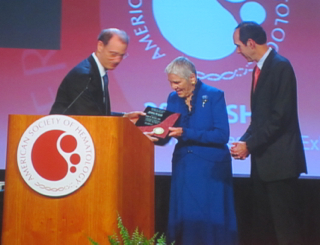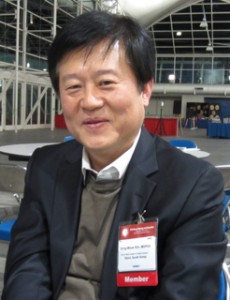CML update from 2011 ASH annual meeting
The annual meeting of the American Society of Hematology (ASH) took place in San Diego this past weekend. There was a lot of interesting science, and over the next three posts I will be writing a brief summary of what caught my attention in CML, AML and the poster sessions.

Brian J. Druker & Janet D. Rowley received the Ernest Beutler prize and presented a lecture on “Chronic Myeloid Leukemia (CML): A Success Story from Chromosomes to Effective Therapy.”
As a result of the development of imatinib (originally STI571), “CML has been converted to a manageable condition”, said Druker.
He also noted that, “the next quantum improvement would be disease eradication.”
Can we aim at a cure? This question was asked by Junia Melo (Adelaide) in the excellent CML education session that also included presentations by Neil Shah (UCSF), Andreas Hochhaus (Jena).
The ASH annual meeting spends a lot of time and effort on educational programs and each year different topics are selected. In previous years I have listened to excellent presentations on AML & CLL. The session is a good way to come up to speed with an area, and usually the presenters highlight topical abstracts at the meeting that are noteworthy.
In her CML education session, Melo suggested that the concept of an “absolute cure: the eradication of the last leukemia cell from the patient’s body” was something that was almost impossible to measure. More realistic was the concept of an “operational cure: the disappearance of all signs of disease and the possibility of blastic transformation.”
Melo presented interesting research on targeting CML stem cells, and conceptual models for drug-free remission (“cure”) that involved stem cell depletion and exhaustion. This may be an area for future drug development.
FTY720 (fingolimod) inhibits self-renewal and promotes apotosis of the quiescent stem cell, said Melo. BMS-214662 was also mentioned as an interesting compound in this area.
The most newsworthy CML data presented at the meeting was on Ponatinib. Jorge Cortes (MD Anderson Cancer Center) presented the phase II results from the PACE (Ponatinib Ph+ ALL and CML Evaluation) clinical trial.
Ponatinib is being developed by Ariad and is an oral, pan-BCR ABL tyrosine kinase inhibitor (TKI) that has activity against the T315i mutation, which is not targeted by other TKIs currently on the market.
Cortes made the following conclusions about the PACE trial results:
- Ponatinib has substantial anti-leukemic activity in a heavily pretreated population
- Responses observed in all cohorts, regardless of mutation or disease stage
- Responses improving over time
- Favorable safety profile in heavily treated patients
- Early efficacy signals similar to initial response results reported in the phase 1 setting
- Ponatinib has the potential to become a promising new treatment option for patients with multi-refractory relapsed CML.
Dr Cortes presented several papers at the meeting, including the 24-month follow-up results from the BELA trial (Bosutinib versus imatinib in newly diagnosed Chronic Myeloid Leukemia).
In the BELA study, the data according to Cortes showed “superior rates of MMR and similar rates of CCyR for bosutinib compared with imatinib with 24 months of follow-up.”
“Bosutinib may offer a new therapeutic option for patients with newly diagnosed CP CML” he noted. Whether bosutinib can obtain regulatory approval remains to be seen given that it did not show superiority to imatinib in its primary endpoint, ie complete cytogenetic response (CCyR).
Another presentation by Dr Cortes was the phase 1 results of DCC-2036, a novel oral inhibitor of BCR-ABL1 Kinase, in patients with Ph+ leukemia including those with the T315i mutation.
DCC-2036 is a switch control inhibitor that inhibits SFK and FLT3, but spares c-KIT. It appears to be a potent inhibitor of BCR-ABL1, and BCR-ABL1 mutants, including the highly resistant T315i mutation. The Phase 1 results showed the drug was well tolerated at MTD with efficacy in refractory CML patients with multiple prior TKI treatments.

One of the benefits of attending ASH is the opportunity to meet experts from around the world. I had a very enjoyable conversation with Professor Dong-Wook Kim from Korea, who told me how he goes mountain climbing every month with his CML patients.
He runs a clinic that sees 50-60% of Korean CML patients and is the lead investigator for Radotinib, (IY5511), a new second generation TKI that is currently in phase 3 trials in Asia.
I was also delighted to note in the CML education session that Dr Hochhaus drew attention to role of CML patients’ advocates.
“The CML community is an outstanding example of global patient advocacy – not to be seen in many other cancers,” Hochhaus said.
With the prospect of generic imatinib in 2015, companies with CML products in development may be in a race against time to seize the market opportunity. It will be interesting to watch the market dynamics over the next few years.